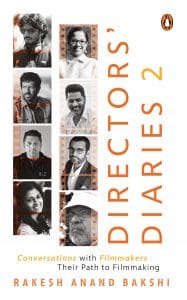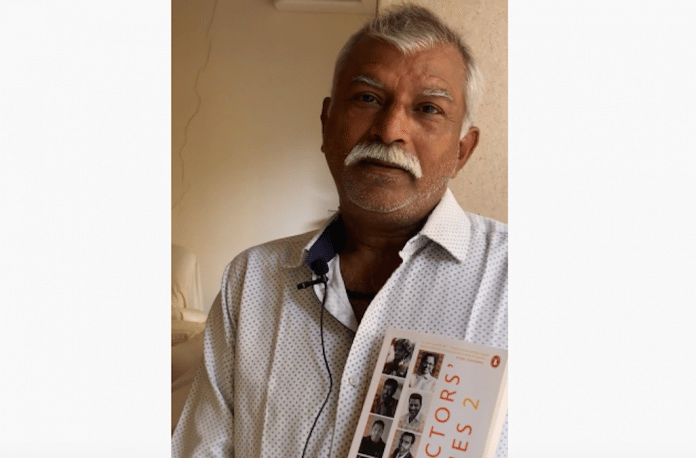Rakesh Bakshi: How did you come to be known as ‘Action’?
Salim Shaikh (SS): Director Prakash Mehra-ji would address me as ‘Action’. Once on a film shoot, back in the 1980s, he asked me to get water for him, and I got it quickly. He told me, ‘You get me the tobacco every time I ask for it faster than my seasoned actors begin their performance when I shout “Action”! From now onwards, I will address you as Action, and I hope it will motivate my actors to be as quick as you!’ I laughed and went about my work, but over the years this name stuck and now even those I have worked with for over three decades do not know that my real name is Salim.
RB: Do film crews usually call you by your name or address you as ‘Spot Dada’?
SS: Few people address us by our names. We like it when they address as a Spot Dada, but it feels great when we know that they know our names. We spot boys do many odd jobs in the long chain of film-making and are largely unnoticed and sometimes appreciated by the crew. People who watch films are unaware of our work and our significance on the film set. Even the people who handle lights and the settings department have greater visibility than us.
There was a time we spot boys would travel from person to person on the film set and offer them water. Nowadays, we just stash a bucket with bottled water and keep it outside the shooting floor and the crew helps itself. We used to hold three glasses in one hand, a kettle of hot tea in the other and do the rounds of the set every now and then until pack-up. We would get skin rashes and burns from the hot kettle; I still have those marks. There was a Punjabi cook who used to make tea in Tony Juneja sir’s films; he would remove the milk cream aside in a bowl while making tea for the crew and very kindly give it to us spot boys to use as medicine for our burns and rashes.
Also read: Why Indians don’t need filmy magazines for juicy Bollywood gossip anymore
RB: Who are the people who may have helped you reach here and become a spot boy?
SS: A man named Kapoor once saw me hanging around idly and sought my help to carry vegetables that he had purchased for the crew’s meal from the market to the kitchen at the shooting location. I helped him and then started doing odd jobs in the kitchen. Thereafter, he made me his permanent assistant. Witnessing the film shoot, I made up my mind that I wanted to work with them and wanted to go to Bombay after the shooting got over in Jaipur. I met the unit supervisor.
He treated me well and like a kid. He advised me that there was no permanency in the film line if I worked as a spot boy. Sometimes there would be work and sometimes nothing for months or even a year. But I insisted and requested him to take me with them to Bombay. But he didn’t, as there was no space in the bus. I had saved Rs 1500 from the odd jobs I had done after running away from home. When I came to Bombay, I was robbed of my money at Dadar railway station and became penniless.
The conductor of the public bus I was travelling in was very kind and took pity on me and took me to his house at Worli that night. He gave me dinner and the next day he gave me breakfast too. This was sometime in the 1980s. He even gave me Rs 100 to spend on travel and food. I had to travel to Khar Danda [Khar West] to look for someone who was going to help me find a job in the film industry. At Khar Danda, I happened to meet Mathur Bhai, the film unit’s cook and he allowed me to stay with him for a few days. He was a very good man. However, I did not find work in Bombay so I returned to Jaipur. Mathur Bhai returned to Jaipur for another shoot so I met him. He had come to shoot Raj Kumar Kohli’s film. I did odd jobs on that shoot for the crew. When the shooting schedule was over, I asked Mathur Bhai to take me to Bombay with him so I could work as a spot boy in the films. He agreed.
RB: Tell us about some of the directors you loved working with.
SS: I miss working with Raj Kumar Kohli sir. He had a good nature and respected everyone, including spot boys and light men. I have seen many directors wasting their producers’ money during shoots by being lazy and uncertain. They are not focused. Raj Kumar Kohli sir never wasted time.
Nowadays, I like working with directors Anil Sharma sir, Raj Kanwar sir, and Aanand L. Rai sir, who reminds me of the directors of the olden days because of his good nature. I have done three films with him. He is so humble and down to earth. If any spot boy, light men or anyone is having food and he likes something on their plate, he will ask them for a bite and pick it up and eat it. In the morning when he comes on set, he shakes hands with everybody, including us. A cinematographer I love to work with is Anil Mehta. I also like working with line producer Shashikant Sinha.
Also read: Jan Nisar Akhtar — Bollywood lyricist who was ‘poet in a real sense’
RB: How keenly do you observe the process of film-making and the crew on set?
SS: I may be just a spot boy, but we can tell in a few minutes if a director knows their job or if they are making a fool of their unit. We have worked with so many of them. I can even tell a good actor in a few shots. I think a good director is like the head of the family or the captain of a team. They make sure that everyone works together like a team. According to me, director Jahnu Barua has these qualities. I have done only one film with him, Har Pal (2005). We had gone to Shillong for the shoot. Before the shoot he would sit with all of us and explain to us what had to be shot that day. It’s also important that a director should not litter, spit here or there and respect the women working on the film. A hit film doesn’t automatically mean that its director is a good person.
Actor Shashi Kapoor sir was one of my favourites. He would get chhole bhature for all the spot boys, production people, light men, etc. He was a foodie and shared his delights with us. He used to get tandoori mutton and place it on the table and whoever wanted to eat was welcome to help themselves. He never discriminated.
There is another person in this industry whom I respect a lot because he respects our work, production designer and art director Nitin Desai. And a cameraman whom I admire a lot is Anil Mehta. He cares for his light men and spot boys.
RB: How important are you really to the film-making process? Would it be justified if I address you too as a film-maker?
SS: According to me, spot boys, light men and the settings department lay the foundation every day in film-making. These three departments together help the unit set up a shoot every day and clear things post pack-up, when all the technicians, actors, cinematographer, producer, director, have gone home. We stay around for at least two more hours after everyone has left and arrive an hour or two before the others. Yet, we are paid only for the duration of our fixed shifts and never for overtime.
 This excerpt from Directors’ Diaries 2: Conversations with Film-makers and their Path to Film-making by Rakesh Anand Bakshi has been published with permission from Penguin Random House India.
This excerpt from Directors’ Diaries 2: Conversations with Film-makers and their Path to Film-making by Rakesh Anand Bakshi has been published with permission from Penguin Random House India.






